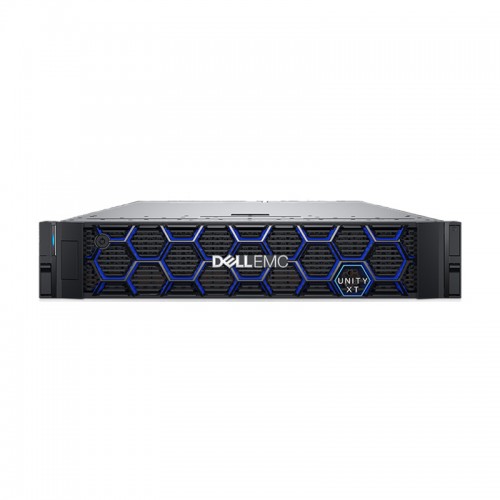- Shop
- Storage solutions
- Dell EMC Unity XT 680
-
Overview
The Dell EMC Unity XT 680 is a high-performance unified hybrid (or all-flash, depending on configuration) storage array designed to consolidate SAN (block) and NAS (file) workloads under a single platform. It leverages dual-active controllers and advanced software to simplify deployment, management, and scalability. The Unity XT platform is built for performance, efficiency, and multi-cloud readiness.
The Unity XT series (including models such as 380, 480, 680, 880 and their “F” all-flash variants) is supported by Dell Technologies. The “XT” indicates the next generation Unity architecture that offers improved I/O performance, increased memory, and higher drive capacity compared to previous Unity models.
Features
The Unity XT 680 supports a wide range of advanced features, including:
- Unified support for block, file, and VMware VVols within a single storage pool
- Inline data reduction (compression, deduplication) to improve effective capacity
- Automated tiering and flash caching to place hot data on faster media
- Built-in data protection: point-in-time snapshots, local and remote replication
- Encryption at rest and secure protocols, with auditing and access controls
- Dual-active storage processors for high availability and performance
- Full multi-cloud interoperability and support (cloud tiering, integration)
- All-inclusive enterprise software stack (no hidden software licensing)
- Scalability through Disk Array Enclosures (DAEs) to expand capacity as needed
Specifications
Component
Specification
Controllers / CPUs
Two storage processors, each with dual-socket Intel processors (total ~48 cores per array) running at ~2.1 GHz per core (Skylake architecture)
System Memory
Up to 384 GB per array (i.e. 192 GB per SP)
Embedded Back-end SAS Ports
4 × 4-lane 12 Gb/s SAS (for drive interconnect)
Optional SAS Ports
Up to 4 optional SAS I/O modules, or two 8-lane 12 Gb/s modules
Max Drives Supported
Up to 1,000 drives (in total, with DAEs)
Drive Types Supported
2.5″ SAS/SSD (for all-flash or hybrid configurations); 3.5″ (NL-SAS) supported in hybrid models
Max Raw Capacity
Up to ~8 PB (petabytes) raw
Minimum Drives
6 drives minimum for a valid configuration
I/O Module Options
• 4-port 16 Gb Fibre Channel • 4-port 25 GbE Optical • 4-port 10 GbE Base-T • 4-port 12 Gb SAS
Power (DPE)
High-line: 1,800 W Low-line: 1,450 W
Physical Dimensions (DPE)
~3.43″ × 17.61″ × 31.32″ (H × W × D)
Controller Redundancy
Fully redundant (dual active controllers)
Data Services
Snapshots, thin provisioning, replication, mirroring, consistency groups
Efficiency Engines
Inline compression, deduplication, tiering, caching
Software
Unified OS with file, block, VVols, with no extra software licensing for core features


